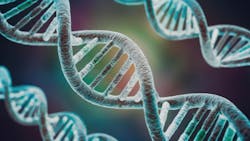AI 'liquid biopsies' using cell-free DNA, protein biomarkers, could aid early detection of ovarian cancer
A blood test that uses artificial intelligence (AI) to detect cancer-related genetic changes and protein biomarkers could help screen women for early signs of ovarian cancer, according to a study by researchers at the Johns Hopkins Kimmel Cancer Center in collaboration with several other institutions in the United States and Europe.
The study, published September 30 in the journal Cancer Discovery, used AI-powered analyses of DNA fragments and two protein biomarkers to identify women with ovarian cancer. The two protein biomarkers, called cancer antigen 125 (CA-125) and human epididymis protein 4 (HE4), were previously identified as ovarian cancer biomarkers but, on their own, could not reliably detect ovarian cancer. However, combining these biomarkers with AI-driven detection of cancer-associated patterns of DNA fragments in the circulation improved screening accuracy and helped distinguish cancerous tumors from benign growths.
“The combination of artificial intelligence, cell-free DNA fragmentomes and a pair of protein biomarkers in a simple blood test improved detection of ovarian cancer even in patients with early-stage disease,” says Victor E. Velculescu, M.D., Ph.D., senior author of the study, professor of oncology, and co-director of the Cancer Genetics and Epigenetics Program at the Johns Hopkins Kimmel Cancer Center. “This AI-enabled approach has the potential to be an affordable, accessible method for widespread screening for ovarian cancer.”
The latest study used blood samples from 94 women with ovarian cancer, 203 women with benign ovarian tumors, and 182 women without any known ovarian growths. The study population used to develop the approach comprised women treated at hospitals in the Netherlands and Denmark. The researchers used the DELFI-Pro test, which combines AI-powered cell-free DNA analysis with tests for CA-125 and HE4, to analyze the samples for ovarian cancer screening. DELFI-Pro was able to detect substantially more cases of ovarian cancer than tests for either protein alone, and it did so with almost no false positives. In fact, it detected 72%, 69%, 87%, and 100% of ovarian cancer cases stages I–IV, respectively, while at the same specificity, CA-125 alone detected 34%, 62%, 63%, and 100% of ovarian cancers for stages I–IV.
To confirm the results, the researchers used the test in a second sample of American women that included 40 patients with ovarian cancer, 50 patients with benign ovarian growths, and 22 without known ovarian lesions. Even in this smaller sample, the test achieved similar success rates, with 73% of all cancers detected and 81% of the high-grade serous ovarian carcinoma, the most aggressive form of the disease, with almost no false positives in women without cancer. The DELFI-Pro test was also able to effectively distinguish between benign growths and cancerous tumors — something ultrasound exams cannot.

